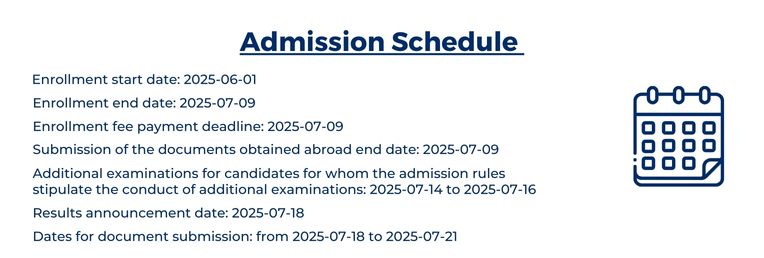Global Communication

| Level of studies: first-cycle studies | Type of Studies: full-time (weekdays) | Duration: 3 years | ||
|---|---|---|---|---|
| Language of instruction: English | Professional title: licentiate (licencjat) | Educational profile: general academic | ||
| Tuition Fee 1 500 PLN |
Programme description
The field of study of 'Global Communication' belongs to the area of education in the humanities. The learning outcomes cover issues from two scientific disciplines, namely linguistics and literary studies.
The study program enables the student to acquire theoretical knowledge and practical skills in linguistics, literary studies, culture and communicology, as well as high skills and competence in the practical knowledge of the major languages: English, Russian and (optional) a second Western European (Spanish or German) or East Slavic (Belarusian or Ukrainian) language.
Equipping graduates with knowledge and skills in interpreting the linguistic, literary and cultural phenomena and contexts of the English and East Slavic areas in a global context, especially in relation to the East-West axis, will allow them to use them practically in professional work of various nature, in which specialized cultural-linguistic-communicative qualifications are necessary.
These qualifications are obtained by graduates during the implementation of groups of subjects, i.e. exercises, conversation classes, laboratories and workshops that make up the block of subjects related to the improvement of communicative skills of non-native, Western European and Eastern European languages, as well as subjects in the fields of communicology, history, language, literature, cultural-literary comparative studies and cultural-social realities.
The study program enables the student to acquire and improve fundamental competencies and skills desired on the labor market, such as effective organization of own work, responsibility in performing assigned tasks, ability to work individually and in teams, ability to make independent choices, awareness of the need for self-education and integration of knowledge from various disciplines.
The first degree program ends with a bachelor's degree in 'Global Communication'. Graduates can continue their studies at the second degree program in majors that require knowledge of English, Russian and a second non-native Western European or Eastern Slavic language, as well as the ability to properly orient themselves in global-cultural-social realities.
Graduate competencies
The aforementioned overarching goal of the degree program is realized through, among other things:
- developing the ability to comprehensively use English as the dominant and thus globalizing language in global communication;
- imparting knowledge of the language, literature, culture and history of the East Slavic area in the context of global phenomena;
- developing the ability to comprehensively use English as the dominant and thus globalizing language in global communication;
- formation of transcultural, translingual and transcommunication sensitivity;
- formation of skills and competencies in the major languages in particular regarding text analysis and interpretation, written and spoken text production;
- development of critical thinking skills, integrating knowledge from various disciplines, formulating problems, drawing conclusions;
- formation of a multifaceted humanistic culture, including the need for continuous education;
- formation of the ability to work individually and in teams, with ethics.
Career prospects
The study program for 'Global Communication' and the course offerings have been developed to meet current socio-economic trends and expectations directed at graduates in the labor market.
Obtained knowledge in the field of communicology, linguistics and literary studies, a range of skills, including in non-native languages, the ability to search and evaluate information, analyze, interpret linguistic, literary and cultural texts, prepare oral and written statements, as well as competencies in the implementation of assigned tasks, teamwork and independent work meet the needs of the labor market.
Thanks to the assumed learning outcomes, graduates will be equipped with knowledge of English and Russian at the B2+ level and communication skills in a third non-native language at the B1 level as well as knowledge of the literature and culture of the East Slavic language area, which they will use while being employed in:
- international organizations and institutions, public administration (international cooperation departments, project and European funds offices, public information offices),
- international non-governmental organizations (INGOs),
- charitable foundations, cultural institutions and cultural-educational institutions,
- enterprises with international reach, marketing and advertising agencies, publishing houses, etc.
- in various positions in marketing, logistics, customer service departments in companies operating in the markets of Central and Eastern Europe, the Caucasus and Central Asia.
Contact details for admission subcommittee
- Phone number: +48 61 829 3576
- working hours: Mon-Fri, 9 a.m. - 2 p.m.

